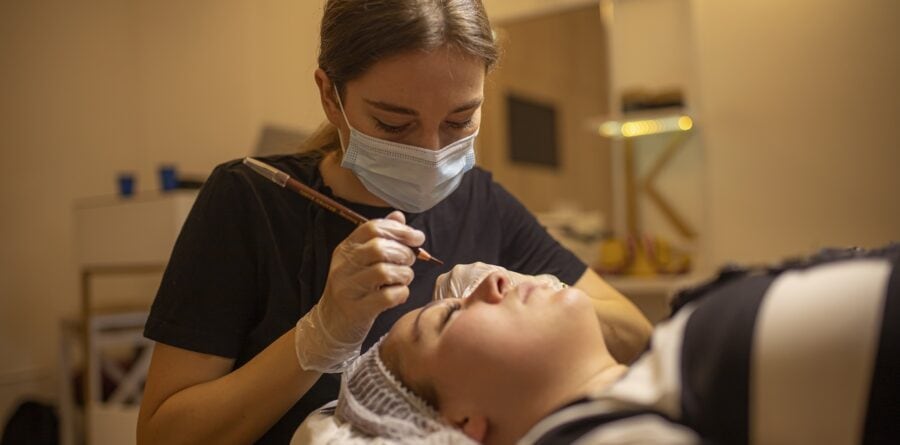18/06/2021
Demand for cosmetic treatments soars ahead of face-to-face meetings this summer
Contributed by PolicyBee
29/10/2020 - PolicyBee

Research conducted by insurance broker PolicyBee reveals that UK searches for aesthetics training courses more than doubled in August 2020 when compared with April 2020’s figures.
After a dip in online searches for aesthetics training during the UK’s national lockdown, the aesthetics industry appears to be bouncing back. The industry’s market has been growing steadily over recent years, with Botox remaining the most popular non-surgical treatment requested in the UK. Demand for cosmetic surgery has remained static or slowed as the non-surgical aesthetics market has rapidly grown in value, estimated to be worth over £3 billion by 2024[1]. In keeping with these trends, online searches for aesthetics training have increased steadily over the past four years, rising over 100% in 2019 compared to 2017.
Searches averaged 7,753 a month in the UK from January to March 2020. However, when the UK was placed into lockdown earlier this year figures fell well below average, with only 5,100 searches conducted in April 2020 (down from 9,750 in January 2020). The decreased search volume reflects the fact that most aesthetics training is hands-on, so had to stop altogether during the strictest months of lockdown.
The latest UK search data shows demand for aesthetics training surging again. August 2020 recorded the highest number of searches all year: 10,960, a huge jump of 115% on April 2020’s numbers. Year-on-year figures for August 2020 compared to August 2019 show a 64% increase in aesthetics training course searches. This leap in demand is encouraging for the sector, and shows optimism for a healthy and expanding future.
Increasing numbers of searches for aesthetics training goes hand in hand with the expansion of the non-surgical cosmetic procedure sector in the UK. A study published in 2018 found that two thirds of 18-34 year olds in the UK were considering a non-surgical cosmetic treatment within the next 21 months.[2] Part of the reason for the rise in searches for aesthetics training post-lockdown may be linked to the phenomenon of ‘lockdown face’[3]. According to Save Face, the UK’s register of accredited cosmetic practitioners, hours of staring at ourselves during video calls while working from home has led to an increased awareness of our appearances and therefore interest in aesthetic procedures.
The search data was gathered by insurance broker PolicyBee, which specialises in providing insurance specifically for aestheticians. PolicyBee’s treatment and professional liability insurance covers both medically and non-medically qualified practitioners providing treatments such as Botox and fillers, microblading and dermaplaning, protecting them against claims of medical malpractice.
Amy Restall, insurance expert at PolicyBee, explained the importance of taking out the right policy: “Treatment and professional liability insurance isn’t just for medically trained practitioners. With the aesthetics industry growing fast in the UK over the last few years, there’s a real need to ensure all aestheticians have suitable insurance cover.
“As well as insuring their own businesses, PolicyBee urges aesthetics practitioners to check that their training providers are fully insured and reputable. Practitioners should always confirm that the training provider or course is recognised by accreditation bodies, such as the JCCP (Joint Council for Cosmetic Practitioners) or the CPD Certification Service, as well as complying with Health Education England’s (HEE) recommendations. The JCCP Education and Training Provider Register provides a list of training courses and qualifications that have been accredited by recognised awarding bodies.
“Malpractice allegations can be brought against anyone providing services with the potential to inflict bodily damage. This includes aesthetic and cosmetic practitioners offering treatments such as Botox and microblading. Unlike indemnity insurance, which isn’t designed to protect against physical harm, treatment and professional liability insurance covers aestheticians for compensation claims. With the search figures showing increasing interest in aesthetics training in the UK, it’s key that newly-qualified practitioners take out the necessary cover.”
The non-surgical aesthetics industry already holds a larger market share than surgical cosmetics procedures and looks set to continue to grow in the UK. After a dip in searches for aesthetics training during the UK’s national lockdown earlier this year, monthly demand for training has climbed steeply. Aesthetics practitioners should ensure any training they undertake is fully accredited and recognised by trade bodies. Alongside this, protecting their business with treatment and professional liability insurance will help mitigate the consequences of any potential claims.
For more information visit PolicyBee website
All articles on this news site are submitted by registered contributors of SuffolkWire. Find out how to subscribe and submit your stories here »